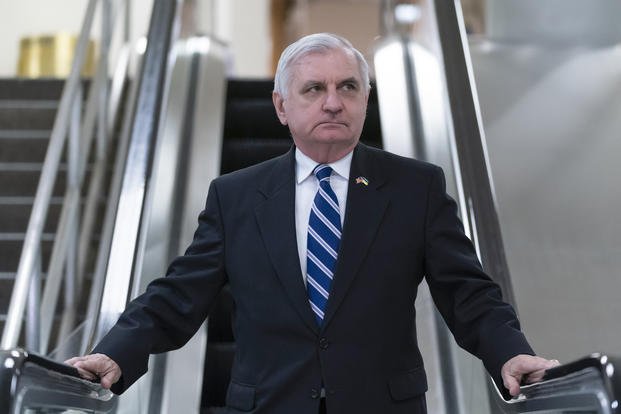Russian use of a weapon of mass destruction in Ukraine could trigger NATO’s collective defense pact if any fallout drifts into an allied country, the leader of the Senate Armed Services Committee said Wednesday.
During a virtual roundtable with reporters, Senate Armed Services Committee Chairman Jack Reed, D-R.I., was asked if Russian President Vladimir Putin using a chemical, biological or nuclear weapon would prompt the United States to reverse its stance on direct U.S. military involvement in the war in Ukraine.
While Reed doubted President Joe Biden would unilaterally send in U.S. troops, the senator raised the possibility of such an attack in Ukraine being considered an attack on NATO.
Read Next: Gendered Scoring, No More Leg Tucks: Army Unveils New Fitness Test. Here’s What You Need to Know.
“It would all be viewed through the lens of, is this an attack against a NATO country triggering Article 5?” Reed said at the event hosted by the Defense Writers Groups, referencing the clause in the NATO charter that covers collective defense.
“If a nuclear device is detonated and the radiation goes into a [neighboring] country, that could very well be perceived as an attack against NATO,” Reed continued, adding that could also be true of “some chemical, biological attacks.”
Under Article 5 of the NATO treaty, an attack on one ally is considered an attack on all allies. Ukraine is not a NATO member, but several of its neighbors, including Poland, Slovakia, Hungary and Romania, are. The first and only time Article 5 has been invoked was after the Sept. 11, 2001, terrorist attacks on the United States.
Days after invading Ukraine last month, as Russian forces were already foundering, Putin ordered his military leadership to put Russia’s nuclear forces on a "special regime of combat duty.” The order was not an official phrase from Russian nuclear doctrine, but was widely interpreted as meaning putting nuclear forces on higher alert.
Since Putin’s order, U.S. officials have repeatedly said they have seen no significant changes in Russian nuclear posture. But fears persist among commentators that Putin, feeling cornered by a failing invasion, could turn to a so-called “tactical” nuclear weapon.
Meanwhile, U.S., Ukrainian and NATO officials have been sounding the alarm about the possibility of Russia using chemical or biological weapons, saying that Moscow is spreading disinformation that the U.S. military has helped Ukraine develop biological weapons as a pretense for its own biological or chemical attack.
“I think it's a real threat,” Biden told reporters Wednesday when asked about the threat of Russian chemical warfare in Ukraine.
Biden was speaking as he left the White House to head to Brussels for an extraordinary NATO summit, where heads of state from the allied countries are expected to agree to bulk up NATO’s posture on its eastern flank.
NATO Secretary-General Jens Stoltenberg also warned Wednesday that Russian use of chemical weapons in Ukraine could have wide-ranging consequences.
"Any use of chemical weapons would totally change the nature of the conflict, it would be a blatant violation of international law and would have far-reaching consequences," Stoltenberg said at a news conference ahead of the summit.
Reed on Wednesday commended Biden for doing a “remarkable job” in unifying NATO so far, but acknowledged that a NATO response to a weapon of mass destruction could be a “very difficult call.”
The Biden administration this week also warned about heightened threats of Russian cyberattacks.
NATO has said for years that a serious cyberattack could trigger Article 5, but Reed expressed concern Wednesday that the threshold for what type of cyberattack would spark a NATO military response is ill-defined.
“My instincts are, it will be a function of scale and probably of the human consequences,” Reed said of what type of cyberattack could trigger Article 5. “If there's a cyber attack that takes out a small section of electricity in an area and no one is hurt, well that's a message. If it's a significant cyberattack and there are significant casualties, that's more than a message. I think that's when you get NATO sitting at the table saying, we can and we must do something. But we're on basically new ground on this.”
-- Rebecca Kheel can be reached at rebecca.kheel@military.com. Follow her on Twitter @reporterkheel.
Related: Russia's False Ukraine Biolab Claims Challenge Pentagon and Spark Biden Warning















